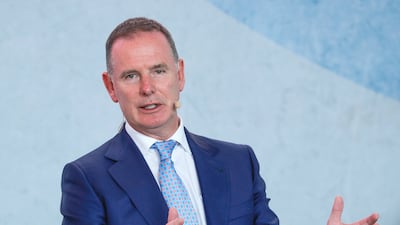Etihad Airways will reveal its new Airbus A350 wide-body aircraft at Dubai Airshow next month and introduce the fuel-efficient jet to its sustainability test-bed programme, its chief executive said.
The airline will add the Airbus A350, jet-powered by Rolls-Royce XWB engines, to its sustainability programme, which currently uses its fleet of Boeing 787 Dreamliners, to focus on finding sustainable flight solutions, Tony Douglas, group chief executive of Etihad Aviation Group, told The National.
“We’re going to introduce it to our broader sustainability programme, so it won’t just be the Greenliner, it will be the Greenliner and the A350-1000 because we’ve got the world’s two most efficient aircraft,” he said. “This is going to be part of a far bigger commitment, to say that Abu Dhabi is a thought leader that actually speaks through its actions as opposed to talking a good talk or having no substance behind it.”
Since 2019, when the Greenliner programme began, Etihad and Boeing have operated several flights aboard the Boeing 787 Dreamliner jet focusing on plastic-free in-flight products, optimised airspace management, flight deck tools for more eco-friendly take-offs, noise reduction and the use of sustainable aviation fuel.
The airline took delivery of its first A350 three months ago and the engineering team is in the process of fitting out the cabin interior, Mr Douglas said.
The first A350 is scheduled to enter into service next year, but the exact date will depend on market conditions, he said.
“It’s to be determined because of Covid, that’s driven by network and demand,” he said. “It will be during 2022 ... it’s dependent on the market recovery and how many aircraft we put back in the sky.”
Mr Douglas was speaking at the International Air Transport Association’s annual general meeting in Boston on Tuesday, a day after the industry body committed to net-zero carbon emissions by 2050 to align the aviation sector’s climate change action to the 2015 Paris Agreement.

Almost two years before the Iata pledge, Etihad Airways had already committed to a target of zero net carbon emissions by 2050 and halving of its 2019 net emission levels by 2035.
“We have been quietly getting on with this,” Mr Douglas said.
The aviation industry executive called on global policymakers to encourage the aviation industry to undertake more sustainable solutions, such as controlled ascent and descent of aircraft, which saves flight time and tonnes of carbon emissions.
“The top of the list I’d be calling for is for policy setters, regulators and governments on a global level to put more effort into incentivising sustainable performance within aviation,” he said.
Etihad said it holds the world record on the longest flight operating on 50 per cent sustainable aviation fuel, on a journey from Charleston to Abu Dhabi. It operates the biggest fleet of the fuel-efficient 787 Dreamliners and is taking delivery of the first of its five A350s.
“We have got such a head start on everybody else, we’re way ahead in terms of the sustainability challenge of reducing carbon emissions by 2035 and more importantly zero [emissions] by 2050,” he said. “We already committed to that two years ago ... and, more importantly, we’ve got a fleet that supports that.”
The issue facing the aviation industry is that production of sustainable aviation fuels needs to be scaled up to higher levels that meet airlines’ demand and at more affordable prices, he said, echoing concerns raised by airline leaders during the three-day Iata meeting. These biofuels are three to four times more expensive than jet fuel.
Looking ahead, Mr Douglas said travel bookings for the winter season are looking “a lot better” after Abu Dhabi removed quarantine requirements for all vaccinated travellers from September 5.
“Our forward booking curve shot up the moment that was announced,” he said.
Etihad this week recorded its highest load factor – a measure of how well the airline fills available seats – in the past 18 months. Its load factor reached 50 per cent this week, up from 25 per cent six months ago, Mr Douglas said.
“It’s a big step in the right direction, but with an awful long way to go,” he said. “We’re quite confident, based on markets now becoming more accessible, that the winter booking curve is moving with real momentum.”










